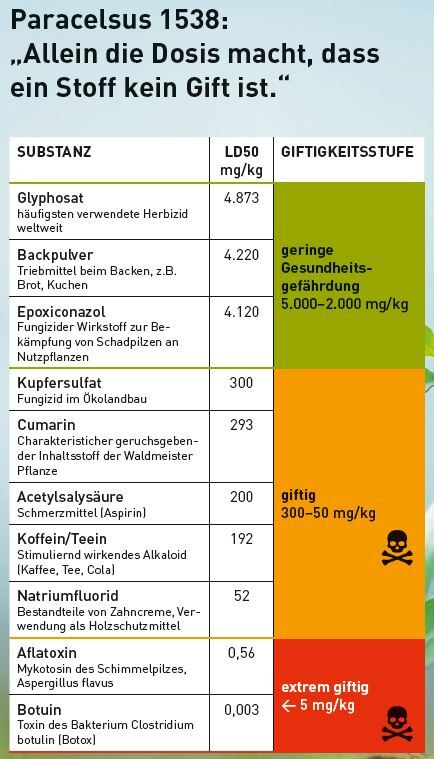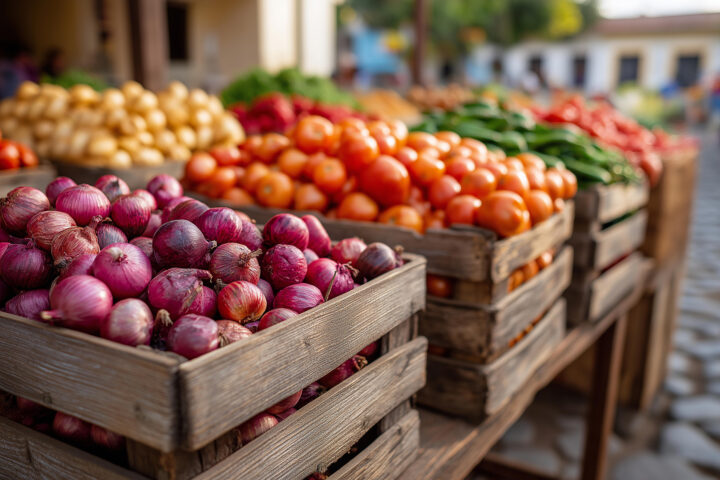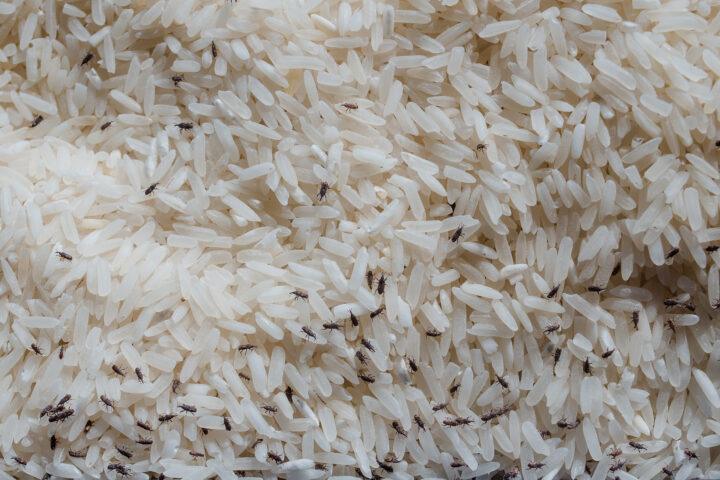
Glyphosate offers many advantages
Glyphosate is the most widely used herbicide in the world. It is mainly used in agriculture to help farmers efficiently and cost-effectively remove unwanted vegetation from fields before sowing.
Monday, January 30, 2023
The most important facts in brief:
- Glyphosate is one of the best-studied crop protection products.
- The herbicide prevents the growth of competing weeds and thus secures harvests.
- Without glyphosate, significantly more land would have to be ploughed, which has a negative impact on soil and climate.
The herbicide thus enables them to achieve up to 22 percent higher yields. For farmers, it is thus an important component for working economically and protecting the environment at the same time. At the end of April 2020, the Federal Food Safety and Veterinary Office (FSVO) published new findings. It concludes that the maximum residue levels of glyphosate in and on food are harmless to consumers.
No danger from food
After glyphosate was classified as "probably carcinogenic" by the International Agency for Research on Cancer (IARC) in 2015, political pressure increased. However, all national and international regulatory authorities classify the herbicide as "non-carcinogenic". The Federal Institute for Risk Assessment (BfR) took more than 1,000 scientific studies into account in its assessment of glyphosate. In 2016, the Federal Food Safety and Veterinary Office launched a food monitoring programme. It investigated the exposure of the population to glyphosate. For this purpose, it took 230 food samples from 19 categories (e.g. wine, bread, vegetables, etc.). The samples confirm that the glyphosate residues found in the food are low and do not pose a health risk.
Glyphosate only affects plant organisms
Glyphosate is the best-studied herbicide in the world. It is primarily used on agricultural land, i.e. on fields that do not serve as the primary habitat and food source for insects. Where wheat or maize is grown, a flowering meadow cannot provide food for insects at the same time. Not only does it degrade very quickly in the soil. Even in humans and animals, minimal residues that have already been found in tests are excreted in a short time via the liver. Glyphosate itself only affects plant organisms. Nonetheless, many are holding out for a future phase-out of glyphosate.
Improved analytics
In recent years, there have been increasing reports of traces of glyphosate in foods such as pasta, beer or oatmeal. However, this is not due to farmers being less careful with glyphosate. The more frequent detections are rather due to the enormous technical progress in analytical techniques. It is now possible to analytically measure the fraction of a sugar cube in Lake Constance. Ever since Paracelsus, we have known the principle: quantity makes the poison. Perhaps this is one reason why critics almost never give concrete quantities when they point to glyphosate residues in food. Mostly, the amounts are in the microgram range - that is the millionth part of a gram or 0.000'001 grams. Glyphosate has a lower toxicity than table salt or baking powder and only affects plant organisms.

Less CO2 emissions
In Swiss agriculture, glyphosate is mainly used to protect soils from erosion. Glyphosate kills weeds before sowing. If the active ingredient is banned, more ploughing will be done in agriculture again. This has negative effects on various soil organisms such as earthworms. In addition, the danger of erosion is particularly great when the soil is ploughed up. When it rains, the soil is washed away from the field even on a slight slope. Instead of building up humus, it is washed away. Soil fertility decreases. An additional problem: the layers of soil that are repeatedly broken up can bind less CO2. This has a negative effect on the climate. French Agriculture Minister Didier Guillaume also points this out in the Figaro. Conservation tillage is not possible without the use of glyphosate. For this reason, farmers in France will be allowed to continue using glyphosate from 2021, despite the planned ban.
Alternatives with disadvantages
An expert report by the Federal Office for Agriculture shows that the alternatives to glyphosate use have disadvantages. The existing substitutes increase the risk of soil erosion. In addition, the alternatives cause higher production costs. Controlling perennial weeds is also more difficult with these methods. In addition, current mechanical methods have increased energy consumption and greenhouse gas emissions compared to glyphosate methods.
Good to know
In recent years, a debate has arisen about a possible carcinogenic effect of glyphosate. In 2015, the International Agency for Research on Cancer (IARC) of the World Health Organization (WHO) published its assessment of glyphosate: the substance is "probably carcinogenic". According to the WHO, the consumption of hot drinks or red meat is also probably carcinogenic. In the approved maximum concentrations - as confirmed today by the majority of scientific studies on the substance as well as the authorities - glyphosate poses no health risk.
Sources
Die Grüne, 28 August 2019: Glyphosat – Zahlen, Daten und Fakten zu den 15 wichtigsten Fragen.
Bundesamt für Lebensmittelsicherheit und Veterinärwesen BLV: Glyphosat.
Der Spiegel, 4 July 2019: «Das Glyphosat-Verbot wird die Umwelt nicht retten».
Kindly note:
We, a non-native editorial team value clear and faultless communication. At times we have to prioritize speed over perfection, utilizing tools, that are still learning.
We are deepL sorry for any observed stylistic or spelling errors.
Related articles

Why cutting out synthetic pesticides will reduce food production
The UK’s action plan to reduce pesticide use could backfire, warns agronomist Greg Dawson: overly strict regulations may make domestic farming unprofitable – and increase the United Kingdom’s dependence on imports.

Approval studies for plant protection products are science-based
The approval of plant protection products in Switzerland is subject to strict legal requirements. Ultimately, this approval process is based on scientifically sound studies. These studies are financed by manufacturers, but they must comply with clearly defined governmental requirements and controls. The aim is to ensure reliability and independence.

Grain beetle eats its way through Swiss grain stores
The grain beetle is spreading in Swiss grain stores. Introduced via international trade, it threatens harvests and impairs food quality.

New problem: soft bugs, native pests discover fruit and vegetables
Soft bugs are spreading at lightning speed in fields and greenhouses in southern Germany. These pests are destroying fruit and vegetables and pushing agriculture to its limits. Effective plant protection products must be found urgently to safeguard harvests.

